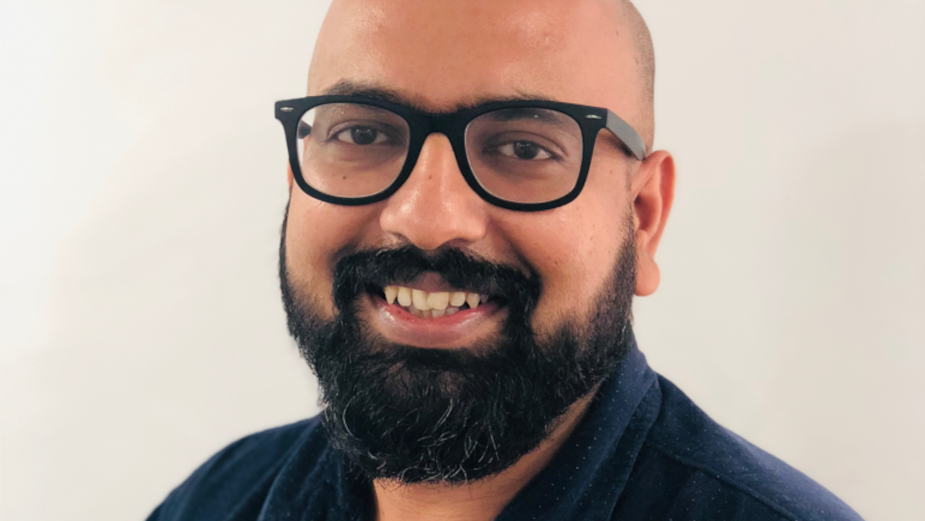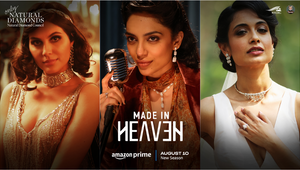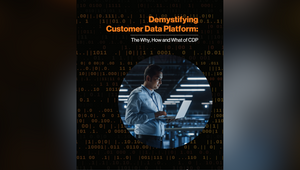
Meet the Technologists: Vishal Jacob

For somebody who has been in the creative and advertising world for just shy of two decades, Vishal Jacob – or VJ - has seen some pretty big changes in that time. From being at the forefront of the dotcom boom to seeing how the power of social media and internet has the ability to change and better the lives of millions, he’s been there through it all. Through witnessing India’s change and how a mobile phone can affect a whole community, there’s no-one better qualified to share their thoughts on the India’s technological and digital advancements.
Now that he’s been deeply rooted in his role at Wavemaker, VJ believes being a problem solver – whether it be for personal, professional of future issues – is his key trait. Here he speaks to LBB’s Natasha Patel about what prompted him to get into advertising, how cheap internet data is key in driving change and what this has done for rural India.
LBB> Tell us about your background and entry into the industry.
VJ> I've been in this industry for quite a long time, almost two decades now. In 2000, just when the dotcom bubble burst, I tried to build my own website called goaclassifieds.com. I hail from Goa in India and so me and my partner got together and created this entity called goaclassifieds.com. It was well ahead of its time, to be honest. At that time, more than 99% of people would prefer to read classifieds on a newspaper and we thought we'd try a bit of disruption and come up with our classifieds portal but it didn't take off.
To drive the behavioural change at that point in time, we didn’t have a lot of funding and a lot of money. It stuck around for about two years and that’s when I had to exit, sell it off, and fund my future education. After that I did my mass communication, and I got into advertising in 2004. I started off my career with Grey, and I've been with the WPP group ever since. My career has been largely born and brought up in programme itself. And I've seen the entire wave of digital. So right from the very first day when I was employed in GroupM, it was a three-member team on the digital marketing team and I've been in the same company and the same team since, I've seen it grown to about 700 people now. So yes, I've seen the entire growth and across various pillars of digital, not just, in digital media and marketing, but all aspects of digital research.
LBB> What does being chief digital officer at Wavemaker India entail?
VJ> I look at solving problems. These can be talent problems, personal problems of professional where someone in the team is struggling with a client – all of these can impact business.
The second type of problem that I try to solve is in the space of client-led challenges where there's a business problem on hand for some of the clients and then they there are multiple reasons why this business problem originated. I explore the genesis of the problem and trying to find the root cause analysis of why this problem actually is happening.
The third type of problem is more about crystal ball gazing into the future to try and see what problems client might want to solve in times to come. And then, how do I prepare an army of people and provide tools and talent to address those problems.
I'm just here to solve problems and the more problems I can solve the more happiness I gather.
LBB> You’ve seen a lot of changes in the past two decades, talk us through what you think have been the biggest for India.
VJ> Purely looking at the evolution of the market, I would say that there was a time in 2005 and 2006, when we actually saw the entire search evolution happened in India. So, we started the entire piece around how to do search marketing, just before Google could actually set up shop in India in 2007. 2006 is when we saw mobile marketing as an initiative kick off in India and then we saw the entire social wave happening in 2009/ 2010. Before Facebook even set up office in India, we started using them as a platform to communicate.
2012-2014 is when we saw data and programmatic take a leap in terms of how to manage audiences, and that entire piece of how to how to apply programmatic buying, through audiences. 2017 and 2018, is when we have seen the ecommerce wave kick off big time. And I think it's propelled a lot since the pandemic, and now we're seeing a way where, it's mix of two or three things coming together. I think it's a very exciting journey and it's an ever-evolving journey.
LBB> What’s been driving that change?
VJ> India has actually seen a transition that’s unlike most countries around the globe. I think the one thing that's unique about India is that digital consumption has never been on a PC. It's always been on a mobile phone. So, for a lot of people their first taste of internet access has been through a mobile phone.
If you look at the problems that most Indians are trying to solve, we start with the mobile phone and apps. Because of this, user behaviour is very different in India compared to most other countries. Data for instance, is the cheapest in India, compared to what you're paying in UK, if I'm not mistaken is for an average one GB the cost of it would be close to about eight pounds or and what we pay in India is 0.2 pounds. So that's the difference in terms of the cost of internet data and as a result of which I think a lot of people accessing video content is quite big in India compared to the world. That’s the change and evolution that we're currently witnessing.
LBB> Other than through mobile, how has media consumption changed recently?
VJ> In India specifically, there's no dearth of content, because we've got multiple OTT partners across the country, with different languages. And that's very, very unique to us, from a consumption standpoint, we consume more video than anyone else, probably due to the cost of data.
The other thing which is again, quite unique to us, is the entire surge of voice as a platform. There are two ends of the spectrum; one is the elderly, who find it very difficult to type on their phones and discovered how WhatsApp can actually be used to send out voice messages. Now they're realising that the same behaviour can be used on Google search and other places, they can just click on a button and speak in their own language, and automatically they will get the search results. The other end of the spectrum is the young kids, teenagers and even the young students for that matters are more comfortable with voice rather than typing.
The other interesting point that I'm noticing is that the way voice is actually not just an urban phenomenon - it's not just about Alexas, and Google Homes of the world where you ask questions and you get answers. But we've seen this happen in very rural markets of India. It’s also in multiple languages, and that's the third behaviour. People are now becoming more comfortable as they see content in their own languages. Initially, you either had to be speaking in English or speaking in Hindi to use the internet. Now, you can use it in multiple different languages. These are the three things shaping the way people are consuming content: video, voice and vernacular languages.
LBB> It’s interesting that you mention the rural market as having access to technology that perhaps they’d not been able to access without a rise in mobile phone usage. For those living in the rural areas of India, how has technology helped them?
VJ> I think both Google and Facebook have had a very active role in driving that change. Google initially started this with it’s Google Station program that rolled out free Wi-Fi in more than 400 railway stations and other public places. When data became very affordable they found no need for this and decided to wind it down.
If you look at Facebook, they've been focusing a lot more on empowering women in villages. They started a program with CSC (Common Service Centre) Academy to provide digital marketing education to village entrepreneurs and teach first-time online users about privacy and security. Through this training they have reached out to 250,000 rural entrepreneurs in more than 3,000 villages. The other interesting thing, which I've also noticed in Facebook is that they're really empowering small and medium enterprises and businesses to launch their businesses purely on WhatsApp. It's interesting because people are finding innovative and interesting ways in creating business models through the use of technology and data is no longer a huge challenge for a lot of people then hence it's also become quite cheap so people would rather spend money on a phone or a device rather than spending money on even for basic needs.
LBB> The way that the likes of Facebook, Instagram and WhatsApp becoming marketplaces is remarkable. Out of the social media platforms, which is the one that consumers generally turn to the most and which has had the biggest change in recent years?
VJ> It's WhatsApp, for sure. Hands down. I think, purely from a from a sense of inertia, as a country we've always been on SMS as a platform. Then we discovered WhatsApp and then WhatsApp groups came into existence. We've always seen multiple platforms succeeding in various markets but in India because of the reach that they've garnered in the very initial stages of evolution, it became difficult for new platforms to come in and replace WhatsApp. As a result of which, it stuck along as a platform where people find it very easy to communicate with one another. Right now whether it's work or whether it's personal, everything happens on one single platform itself.
LBB> How has ecommerce pivoted in recent months?
VJ> We've seen a 60% growth in ecommerce during the pandemic - 60% growth on business is unheard of!
LBB> What do you think the rest of the world can learn from the way India has transformed via the use of technology?
VJ> The way we deal with people in different languages. If you look at India, every single state could be a country in itself. So, whether it's 25 states, we might as well look at it as 25 different countries. When you look at it from that lens, I think the way in which we've been able to manage a very complex market and looking at the way we go about segmenting audiences for brands, I think has been something which is very unique to our market compared to two other markets.
I'd say that the way in which we can go about segmenting audiences for a very complex country like us based on the locations, based on social economic class, based on the kind of handsets that people have and look at various audience signals.
LBB> So much is happening with digital and technology in India at the moment, do you have any predictions for the future?
VJ> I genuinely feel an area that's going to see a lot of growth is social commerce. In India, we're seeing a lot of platforms, social platforms, building their commerce legs. And I think that there is a bit of evolution in the way ecommerce is also evolving. So traditionally, you would go to a marketplace like Amazon and Flipkart and actually make a search. But now we're seeing that there are new age platform tech trails coming, where people are there for a different purpose, therefore, social networking, but while they're there, they're currently seeing a lot of interesting products being pitched by some of the influencers, and then they can click on that and then buy the product on the platform itself without navigating to a different platform. We've seen a social platform building a commerce click, and then we see commerce platform building a content click. The entire version, I think the lines blurring between content and commerce is going to be something that to watch out for.













